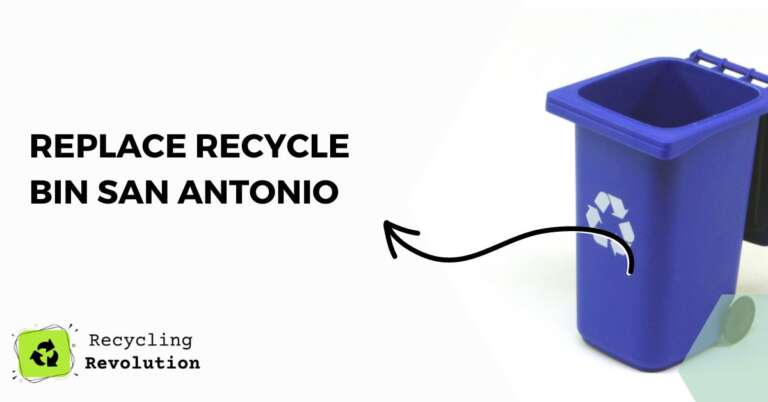TL;DR: If you’re in San Antonio and you need to replace your recycle bin, contact the Solid Waste Management Department. Simply give them a call, report the issue, and they will handle the replacement process for you. Remember to sort your recyclables correctly and consider composting or donating usable items as eco-friendly alternatives.
When and Why to Replace Your Recycle Bin in San Antonio
San Antonio’s Solid Waste Management Department is committed to making our city cleaner and greener. However, this can only be achieved with your cooperation, which includes appropriately managing your recycling bin.
Over time, these bins can become damaged or worn out, reducing their effectiveness and necessitating replacement.
Common reasons for needing a bin replacement include:
- Physical Damage: Cracks, holes, or a broken lid can compromise the bin’s ability to hold and protect recyclables.
- Wear and Tear: Bins exposed to the elements can fade or degrade over time.
- Size: If the current bin isn’t big enough for your household’s recycling needs.
The Replacement Process
If you’ve determined that your recycling bin needs replacing, the process is relatively simple. Here are the steps I recommend:
Contact the Solid Waste Management Department
You can reach them at 3-1-1 or (210) 207-6000. They are available Monday through Friday from 7:00 am to 7:00 pm, and Saturday from 8:00 am to 5:00 pm. Let them know the nature of your problem and they’ll guide you through the next steps.
Request a Bin Replacement
Once you’ve explained the situation, the department will schedule a time to replace your bin. It’s generally pretty prompt, but it can take a few days depending on their schedule.
Set Out Your Damaged Bin
On the scheduled day, make sure your damaged bin is empty and accessible for the replacement team. They will swap out your damaged bin for a new one.
Understanding the Types of Recyclable Waste
In San Antonio, like many other cities, waste is categorized into different types to streamline the recycling process. Knowing what waste goes where is an integral part of making the recycling process more efficient.
- Blue Bins: These are meant for dry recyclables like paper, cardboard, metal cans, and plastic containers. Remember, these materials should be clean and dry before being placed in the bin.
- Green Bins: These are for organic waste, including food scraps, yard waste, and non-recyclable paper like napkins and paper towels. This organic waste can be composted and turned into a nutrient-rich soil amendment.
- Brown Bins: These bins are for non-recyclable waste that is destined for the landfill. It’s crucial to minimize the amount of waste sent to brown bins.
Note: Every city might have different colored bins or rules for segregation. Always check the specific rules for your city.
San Antonio’s Recycle Right Program
San Antonio’s Solid Waste Management Department has introduced a program known as Recycle Right. This program aims to educate residents on proper recycling procedures.
The program’s main goals are to reduce contamination in recycling, increase recycling rates, and decrease the amount of recyclable material going to the landfill.
As part of the Recycle Right program, the city provides educational resources and outreach programs for residents, businesses, and schools. I highly recommend checking out these resources to understand the dos and don’ts of recycling in San Antonio.
Other Services Provided by the Solid Waste Management Department
The Solid Waste Management Department in San Antonio also offers a variety of other services that can help residents reduce their environmental footprint.
- Bulky Waste Collection: This service allows residents to dispose of large items that do not fit in their regular trash bins, such as furniture, appliances, and other large items.
- Household Hazardous Waste: The city provides a drop-off service for household hazardous waste. This includes items such as batteries, paint, motor oil, and pesticides, which should never be disposed of in regular trash or recycling bins.
- Dead Animal Collection: Unfortunately, this is a necessary service in any city. If you encounter a deceased animal, the city can collect and dispose of it in a safe and respectful manner.
Adopting a Zero-Waste Lifestyle
Apart from managing your recycle bin effectively, adopting a zero-waste lifestyle can contribute significantly to waste reduction. Here are a few suggestions:
- Reduce Consumption: Before purchasing anything new, ask yourself if it is necessary. Can you do without it, or can you use something you already have instead?
- Reuse and Repair: Instead of throwing away items that are broken or no longer serve their original purpose, try to repair them or find another use for them.
- Refuse Single-Use Items: Single-use items, especially plastics, create a lot of unnecessary waste. Try to refuse these items whenever possible and opt for reusable alternatives.
- Buy in Bulk: Buying in bulk can reduce the amount of packaging waste you produce. Remember to bring your own reusable containers!
- Support Local: Local businesses often have more sustainable practices than large corporations. Plus, supporting them helps boost the local economy.
By following these steps, you can make your life more eco-friendly and contribute to a greener San Antonio. Every little step counts towards the big picture of sustainability.
Eco-friendly Tips and Alternatives
While having an effective recycling bin is a crucial step in waste management, there are several other methods to minimize waste and boost your eco-friendliness:
- Composting: Instead of throwing organic waste into the bin, consider composting. It reduces landfill waste and creates nutrient-rich soil for your garden.
- Donating: Before throwing items away, consider if they could be of use to someone else. Donating to charities or second-hand stores is a great way to extend the life of your items.
- Correctly Sorting Recyclables: Always rinse and sort your recyclables. Contamination can lead to entire batches of recycling being sent to the landfill instead.
Note: Remember, not all items can be recycled. Be sure to check the guidelines provided by the Solid Waste Management Department.
Conclusion
Replacing your recycle bin in San Antonio is an easy task with the support of the Solid Waste Management Department. It’s crucial to keep your recycling bin in good condition for effective waste management.
But remember, reducing, reusing, and donating are equally, if not more, important in our journey towards a sustainable San Antonio.
FAQs
How do I contact the Solid Waste Management Department?
You can reach them by dialing 3-1-1 or (210) 207-6000.
How long does it take to get a replacement bin?
It usually takes a few days, depending on their schedule.
What should I do with my damaged bin?
Set it out for collection on the scheduled replacement day. It should be empty and easily accessible for the team.
What can I do to reduce waste?
Consider alternatives like composting, donating usable items, and correctly sorting your recyclables.
What items are not recyclable?
This can vary, so it’s best to check with the Solid Waste Management Department. Generally, items like plastic bags, styrofoam, and certain types of glass cannot be recycled.

